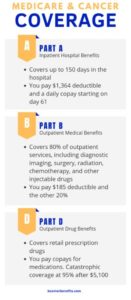How Does Medicare Cover Cancer? Part 1 of 2

By Danielle Kunkle Roberts
A cancer diagnosis is devastating, regardless of your age. But if you’re a senior on a fixed income, you have additional concerns—especially your medical costs and whether or not Medicare will cover your care.
The good news is that Medicare does cover many expenses associated with your cancer treatment. Your out-of-pocket obligations depend on which Medicare plan you choose.
If you’re a senior facing cancer, here’s what you need to know about your coverage under Medicare.
What cancer treatment costs are covered by Medicare?
Medicare covers any medically necessary services to diagnose and treat your cancer. This includes doctor visits, diagnostic tests, laboratory costs, surgeons’ fees, inpatient hospital expenses, outpatient radiation and chemotherapy, and any necessary rehab services, durable medical equipment, and home health care you may need provided you meet certain Medicare requirements.
Generally speaking, your Part A benefits cover inpatient care, whether you are admitted to the hospital or a skilled nursing facility during your cancer treatment. It also covers some home health services and hospice care, if your cancer is terminal and you elect to enroll in a hospice program.
Part B covers all your outpatient care, including doctor visits, outpatient radiation and chemotherapy, physical, occupational, and speech-language therapy, and even certain prescription drugs needed to manage chemotherapy side effects. It also covers medical equipment and devices you may need, such as a wheelchair or walker, a hospital bed at home, and home oxygen.
Part B covers many oral chemotherapy drugs, and medications to manage nausea you take at home. Aside from these medications, however, there is limited prescription drug coverage under Original Medicare.
If you are enrolled in a Medicare Advantage plan, you don’t lose any benefits. Although these are private plans, by federal law, they must cover—at a minimum—everything covered by Original Medicare. In other words, you don’t lose any benefits if you choose Medicare Advantage. In fact, you may even gain additional benefits such as Part D prescription drug coverage for medications you take at home, and benefits for routine vision, dental, and hearing care.
Part 2, to be posted on August 22nd, will focus on how to get help with cancer treatment costs with Medicare and what out-of-pocket costs to expect.
Post with How Does Medicare Cover Cancer Infographic

Danielle is a Medicare insurance expert who writes regularly for many online publications, including Forbes, where she is a member of the Finance Council. A TCU journalism graduate and former magazine editor, she enjoys sharing her knowledge about Medicare, retirement and insurance so that baby boomers can prepare for the costs of healthcare in retirement. She regularly appears as a guest expert on healthcare podcasts and radio shows.





